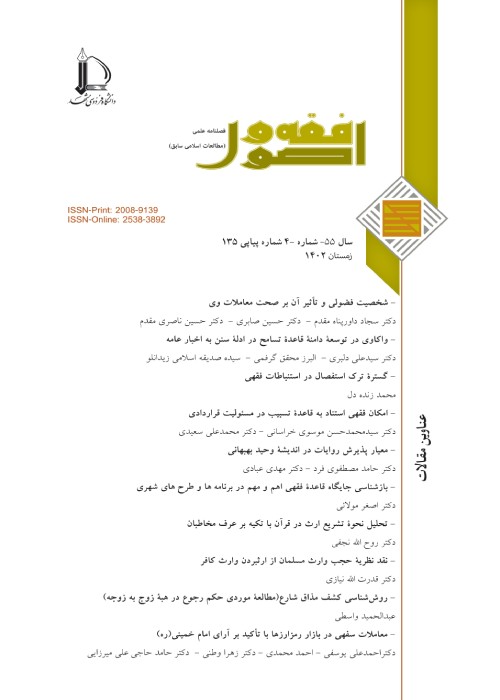Analyzing the Bases of Conflict Concerning the Repelling Dubiety Criterion from the Viewpoint of Imami Jurists
Dubiety, from the perspective of Islamic criminal jurisprudence and positive law is among essential fancies but it has a relatively ambiguous nature and is applied in case of depenalization. According to the general opinion of jurists, accreditation of dubiety and its impact on punishment is a necessary and obligatory task. However, there is diversity in their views on what is the criterion of repelling dubiety or in assessing the strength and weakness of the dubiety, to the extent that in some cases, it has made the work difficult for judicial experts.Examining the views of Islamic jurists regarding the interaction between the institution of dubiety and components such as "negligent ignorance" and " ignorance caused by fault" and identifying the addressee of the rule of repellence, paves the way for determining the criterion of dubiety so that the general model and the idea of "dubieties" are established on the basis of dynamic jurisprudential and legal teachings. Using a descriptive method based on inductive analysis of particulars, following the inferential method relying on literal and Usuli rules, this research intends to move from particular propositions to universal propositions. As far as the function of the repellence rule is concerned, there is no difference between the situation of dubiety concerning the precept or dubiety concerning the instance and the state of a belief contrary to the reality and dubiety is a broad fancy and imagination that includes the cases of knowledge and certainty and conjecture, even where there exists a principle or authorized conjectural proof denoting religious prohibition. Another outcome of this research is that if dubiety and imagination, in the mind of the perpetrator who is aware of the religious precept, provoke rational personal conjecture, although invalid from the perspective of Sharia, as to the permissibility of a behavior, it can constitute a basis for waiver of Haddi penalty.
- حق عضویت دریافتی صرف حمایت از نشریات عضو و نگهداری، تکمیل و توسعه مگیران میشود.
- پرداخت حق اشتراک و دانلود مقالات اجازه بازنشر آن در سایر رسانههای چاپی و دیجیتال را به کاربر نمیدهد.



